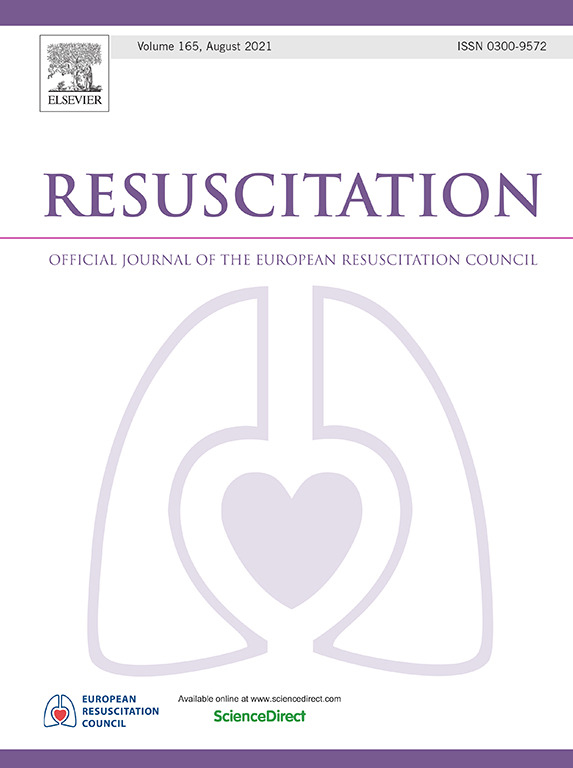心脏骤停幸存者长期认知功能、情绪困扰和健康相关生活质量的早期预测
IF 4.6
1区 医学
Q1 CRITICAL CARE MEDICINE
引用次数: 0
摘要
背景:心脏骤停幸存者在认知、情绪困扰和健康相关生活质量(QoL)方面存在长期障碍的风险。早期预测可以指导有针对性的治疗。我们评估了早期临床措施能否预测长期结果。方法:在一项纵向多中心队列研究中,我们前瞻性地纳入了心脏骤停后恢复意识的患者。住院期间的潜在预测因素包括医院焦虑和抑郁量表(HADS)、蒙特利尔认知评估(MoCA)和Barthel指数评分,以及24小时内谵妄和短暂性昏迷的存在。这些与认知功能(MoCA)、情绪困扰(HADS)和健康相关的生活质量(EQ-5D-5L)在12个月时使用多变量混合效应模型,以年龄和性别为辅助变量。计算认知障碍的似然比(MoCA结果:我们纳入了100例患者;20%的人在12个月时表现出认知障碍,8%和10%的人分别表现出焦虑和抑郁的迹象。早期MoCA与12个月MoCA呈边缘性显著正相关(β = 0.21, p = 0.05)。结论:住院期间MoCA和HADS评分与心脏骤停后的长期认知和情绪结局有关。这些措施可能有助于确定哪些患者可以从认知康复或社会心理支持中受益。本文章由计算机程序翻译,如有差异,请以英文原文为准。
Early prediction of long-term cognitive function, emotional distress, and health-related quality of life in cardiac arrest survivors
Background
Cardiac arrest survivors are at risk of long-term disturbances in cognition, emotional distress, and health-related quality of life (QoL). Early prediction can guide tailored treatment. We evaluated whether early clinical measures predict long-term outcomes.
Methods
In a longitudinal multicenter cohort study, we prospectively included patients who regained consciousness after cardiac arrest. Potential predictors during hospitalization were scores on the Hospital Anxiety and Depression Scale (HADS), Montreal Cognitive Assessment (MoCA), and Barthel Index, and presence of delirium and transient coma >24 h. These were related to cognitive function (MoCA), emotional distress (HADS), and health-related QoL (EQ-5D-5L) at twelve months using multivariate mixed-effects models, with age and sex as covariates. Likelihood ratios were calculated for cognitive impairment (MoCA < 26).
Results
We included 100 patients; 20 % showed cognitive impairment at twelve months and 8 % and 10 % showed signs of anxiety and depression, respectively. Early MoCA showed a borderline significant positive relation with twelve-month MoCA (β = 0.21, p = 0.05). The likelihood ratio for early MoCA < 26 predicting cognitive impairment at twelve months was LR+ 1.29 (95 % CI: 0.40–4.20) and LR- 0.60 (95 % CI: 0.18–1.94). Early HADS was associated with twelve-month HADS (β = 0.47, 95 % CI: 0.33–0.60, p < 0.001), with age negatively associated (β = −0.10, 95 % CI: −0.18 to −0.02, p = 0.019). No other significant relations were found.
Conclusion
MoCA and HADS scores during hospitalization relate to long-term cognitive and emotional outcomes after cardiac arrest. These measures may help identify patients who could benefit from cognitive rehabilitation or psychosocial support.
求助全文
通过发布文献求助,成功后即可免费获取论文全文。
去求助
来源期刊

Resuscitation
医学-急救医学
CiteScore
12.00
自引率
18.50%
发文量
556
审稿时长
21 days
期刊介绍:
Resuscitation is a monthly international and interdisciplinary medical journal. The papers published deal with the aetiology, pathophysiology and prevention of cardiac arrest, resuscitation training, clinical resuscitation, and experimental resuscitation research, although papers relating to animal studies will be published only if they are of exceptional interest and related directly to clinical cardiopulmonary resuscitation. Papers relating to trauma are published occasionally but the majority of these concern traumatic cardiac arrest.
 求助内容:
求助内容: 应助结果提醒方式:
应助结果提醒方式:


